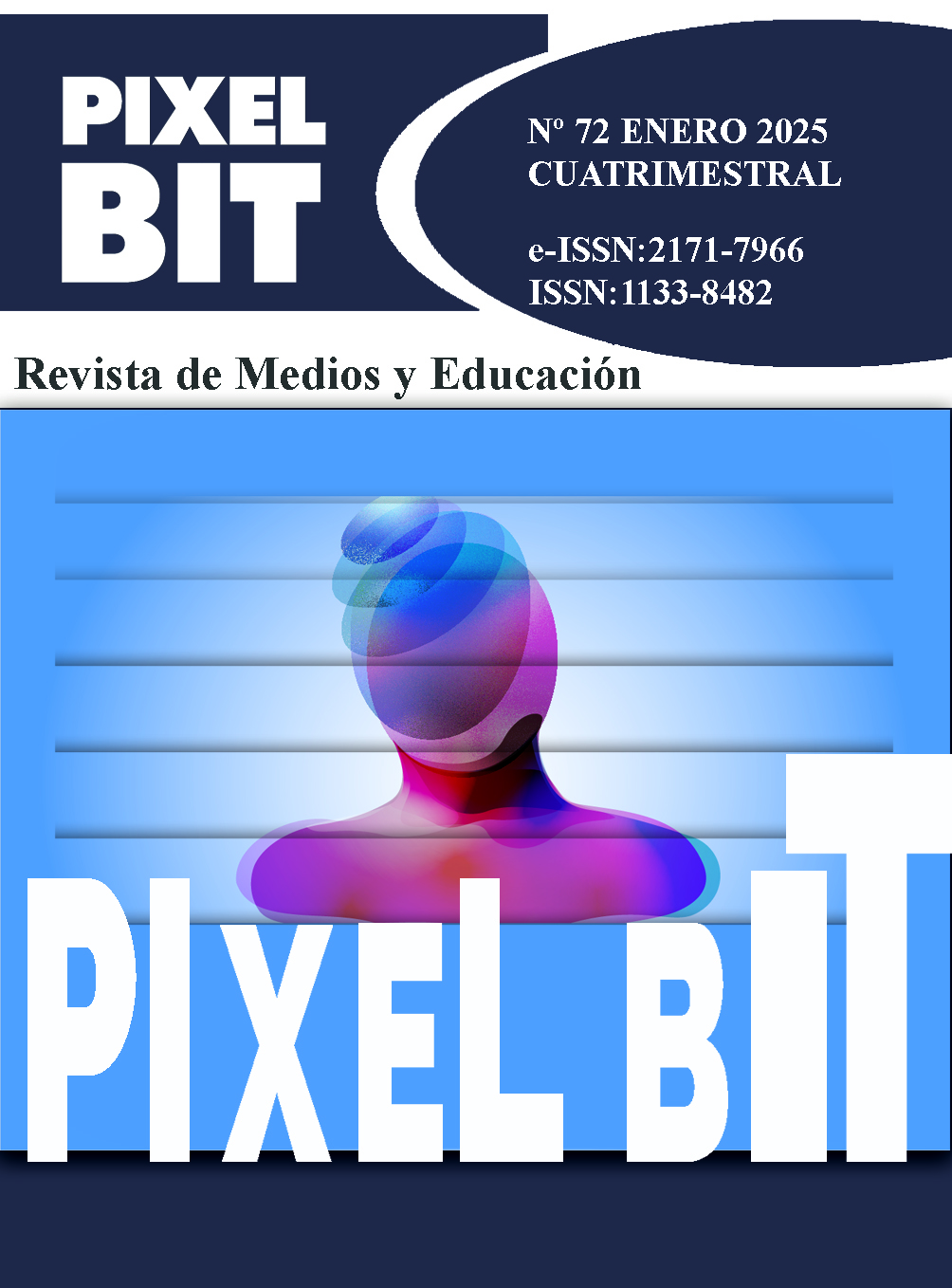Abstract
The main objective of this research is to explore and understand the development and implementation of AI in the context of higher education at a scientific and social level, using a systematic methodology of reviewing scientific papers from the Web Of Science (WOS) database for the scientific part and a social listening analysis for the social field. The bibliometric study, through the Rstudio Cloud application, allows us to extract a meta-analysis on the topic of IA in higher education, from 2019 to the present, achieving an evaluation of 32 articles according to the guidelines of the PRISMA declaration.
For its part, the Brandwatch platform allows us to find out what is being said online about the use of AI in higher education, studying a total of 27,735 mentions, only from the last year.
By comparing the scientific and social results, conclusions are drawn on the current challenges of AI in universities, highlighting the need for researchers to start analysing the impact of the good use of AI tools as a teaching methodology, so that society can also highlight it in its mentions on the networks.
References
Alonso-de-Castro, M.G., & García-Peñalvo, F.J. (2022). Successful educational methodologies: Erasmus+ projects related to e-learning or ICT. Campus Virtuales, 11(1), 95-114. https://doi.org/10.54988/cv.2022.1.1022
Aria, M., & Cuccurullo, C. (2017). Bibliometrix: An R-tool for comprehensive science mapping analysis. Journal of Informetrics, 11(4), 959-975. https://doi.org/10.1016/j.joi.2017.08.007
Arksey H, O ́Malley L. (2005). Estudios de alcance: hacia un marco metodológico. International Journal of Social Research Methodology, 8(1), 19-32. https://doi.org/10.1080/1364557032000119616
Barquero Morales, W. G. (2022). Análisis PRISMA como metodología para revisión sistemática: una aproximación general. Saúde Em Redes, 8 (sup1), 339–360. https://doi.org/10.18310/2446-4813.2022v8nsup1p339-360
Cambria, E. (2016). Affective computing and sentiment analysis. IEEE Intelligent Systems, 31(2), 102-107. https://doi.org/10.1109/MIS.2016.31
Fajardo Aguilar , G. M., Ayala Gavilanes , D. C., Arroba Freire , E. M., & López Quincha , M. (2023). Inteligencia Artificial y la Educación Universitaria: Una revisión sistemática. Magazine De Las Ciencias: Revista De Investigación E Innovación, 8 (1), 109–131. https://doi.org/10.33262/rmc.v8i1.2935
Fidalgo-Blanco, A., Sein-Echaluce, M.L., & García-Peñalvo, F.J. (2022). Método basado en Educación 4.0 para mejorar el aprendizaje: Lecciones Aprendidas de la COVID-19. RIED, 25(2), 49-72. https://doi.org/10.5944/ried.25.2.32320
Halili, S. H. (2019). Technological advancements in education 4.0. The Online Journal of Distance Education and E-Learning, 7 (1), 63–69. https://bit.ly/46dpmR4
Herrera, L.C., Majchrzak, T.A., Thapa, D. (2022). Principles for the Arrangement of Social Media Listening Practices in Crisis Management. In: Sanfilippo, F., Granmo, OC., Yayilgan, S.Y., Bajwa, I.S. (eds) Intelligent Technologies and Applications. INTAP 2021. Communications in Computer and Information Science, vol 1616. Springer, Cham. https://doi.org/10.1007/978-3-031-10525-8_22
Hinojo-Lucena, F.-J.; Aznar-Díaz, I.; Cáceres-Reche, M.-P.; Romero-Rodríguez, J.-M. (2019). Artificial Intelligence in Higher Education: A Bibliometric Study on its Impact in the Scientific Literature. Education Science 9, 51. https://doi.org/10.3390/educsci9010051
Jimbo-Santana, P. ., Lanzarini, L. C. ., Jimbo-Santana, M. ., & Morales-Morales, M. (2023). Inteligencia artificial para analizar el rendimiento académico en instituciones de educación superior. Una revisión sistemática de la literatura. Cátedra, 6(2), 30–50. https://doi.org/10.29166/catedra.v6i2.4408
Li, J., Goerlandt, F., & Reniers, G. (2021). An overview of scientometric mapping for the safety science community: Methods, tools, and framework. Safety Science, 134, [105093]. https://doi.org/10.1016/j.ssci.2020.105093
Lu, L. L. y Harris, L.A.. 2018. Artificial Intelligence (AI) and Education. FOCUS: Congressional Research Service. Consultado en https://fas.org/sgp/crs/misc/IF10937.pdf
Martínez-Comesaña, M., Rigueira-Díaz, X., Larrañaga-Janeiro, A., Martínez-Torres, J., Ocarranza-Prado, I., & Kreibel, D. (2023). Impacto de la inteligencia artificial en los métodos de evaluación en la educación primaria y secundaria: revisión sistemática de la literatura. Revista de Psicodidáctica, 28 (2), 93-103. https://doi.org/10.1016/j.psicod.2023.06.001
Moreno, L., & Pedreño, A. (2020). Europa frente a EE.UU. y China. Prevenir el declive en la era de la inteligencia artificial. KDP. https://bit.ly/3PFeOS2
Page, M. J., Mckenzie, J. E., Bossuyt, P. M., Boutron, I., Hoffmann, T. C., Mulrow, C. D. & Moher, D. (2021). Declaración PRISMA 2020: una guía actualizada para la publicación de revisiones sistemáticas. Revista Española de Cardiología, 74(9), 790–799.https://doi.org/10.1016/j.recesp.2021.06.016
Ramírez-Montoya, M.S., Castillo-Martínez, I.M., Sanabria-Z, J., & Miranda, J. (2022). Complex thinking in the framework of education 4.0 and open innovation-a systematic literature review. Journal of Open Innovation, 8(1), 4. https://doi.org/10.3390/joitmc8010004
Salas-Pilco, S. Z., & Yang, Y. (2022). Artificial intelligence applications in Latin American higher education: a systematic review. International Journal of Educational Technology in Higher Education, 19(1). https://doi.org/10.1186/s41239-022-00326-w
Song, P. & Wang, X. (2020). A bibliometric analysis of worldwide educational artificial intelligence research development in recent twenty years. Asia Pacific Education Review, 21(3), 473–486. https://doi.org/10.1007/s12564-020-09640-2
Stieglitz, S.; Mirbabaie , M.; Ross, B. and Neuberger, C. (2018). Social media analytics—Challenges in topic discovery, data collection, and data preparation. International Journal of Information Management, 39, 156–168. https://doi.org/10.1016/j.ijinfomgt.2017.12.002.
Telefónica (2019). Informe Things Matter 2019. La experiencia del usuario de Internet de las Cosas en España. https://iotbusinessnews.com/download/white-papers/TELEFONICA-white-paper-things-matters-2019.pdf
Zawacki-Richter, O., Marín, VI, Bond, M. y Gouverneur, F. (2019). Revisión sistemática de la investigación sobre aplicaciones de inteligencia artificial en la educación superior: ¿dónde están los educadores? Revista Internacional de Tecnología Educativa en la Educación Superior , 16 (1), 1-27.

This work is licensed under a Creative Commons Attribution-NonCommercial-NoDerivatives 4.0 International License.
Copyright (c) 2025 Pixel-Bit. Media and Education Journal

